SoJam 2011 Collegiate Competition (Plus, Sundry Thoughts from the Weekend)
November 11-13 marked the ninth annual SoJam. For the uninitiated, SoJam is an a cappella festival coordinated by The Contemporary A Cappella Society (CASA). Among the highlights of this year’s festival were a collegiate competition that included two 2011 ICCA finalist groups (the full review starts below), a dynamite professional group showcase, a series of workshops, and a pair of memorable end-of-the-day after parties. I’ll get into more sundry thoughts on the weekend at the end of this post, but right up front, I wanted to give a quick shout out to a few of the a cappella luminaries we had the pleasure of connecting with this weekend: Overboard's Alfredo Austin; world champion beatboxer and out-of-this world bass fromThe Boxettes Bellatrix; LA-based music director and arranger, and alum of the SoCal VoCals Ben Bram; long-time CASA board member and Recorded A Cappella Review Board (RARB) coordinator Benjamin Stevens; recorded a cappella virtuoso Bill Hare, A Cappella Records founder/president and CASA board member Chris Crawford; Mouth Off podcast hosts, CASA extraordinaires, and all-around swell guys Chris Diaz and Dave Brown, ACB Who’s singing blogger and Syracuse Orange Appeal all-star Keith Tripler; superstar of The Sing-Off’s Delilah, Berklee Pitch Slapped, and Musae Hannah Juliano; The Vocal Company’s UNC Sapphires alum Jill Clark, Liquid 5th Productions’ Josh Chopak; uber-talented member The Sing-Off’s Kinfolk 9 and Musae Kari Francis; L's Arrangements’ female a cappella arranging guru Laura Long; Musae co-founder, Acalosophy blogger, and all-around a cappella wonder woman Lo Barreiro; the mastermind behind SIN3G Mark Torres; RARB publisher and founder of Columba Nonsequitur Michael Marcus, a cappella evil genius and the guy behind the new Human-Feedback Rob Dietz, Voice Box's Sean Matthews and Brendan McCann; and the arranger extraordinaire behind Random Notes Tom Anderson. In addition, though I didn’t get to meet him, I was thrilled to walk away with my copy of Stephen Harrison’s newly released Acapolitics novel (ACB review pending!).
One of the most frustrating things about compiling this list is knowing I probably left off a dozen or more amazing people (not to mention, tons of the impressive additional credentials for the people above)—no disrespect intended, and rest assured, it was fantastic to see you all.
Whew! All right, on to that review of Friday night’s collegiate competition. The show went down at The Carolina Theatre, and here’s a snapshot of what went down.
The Competitors:
The University of South Carolina Cocktails
North Carolina State University Acappology
The University of North Carolina at Greensboro Sapphires
The Duke University Pitchforks
The Florida State University AcaBelles
Berklee College of Music Pitch Slapped
Host Groups:
Overboard
Musae
Photos from the event will be available shortly (if they aren't there already) on The ACB Facebook page.
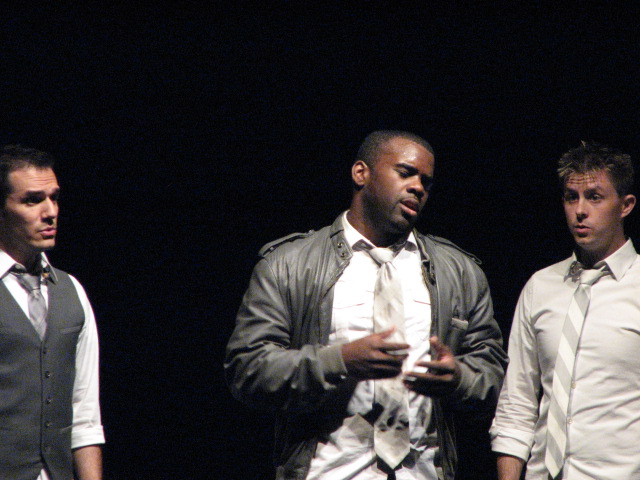
Boston-based pros Overboard served as emcees and opened the evening’s music with a really fun, smooth rendering of Cee-Lo Green’s “Forget You.” Fun little moment as the guys motioned for the crowd to sing along, and there was a second of “wait, me? I thought you were singing now…” before the soloist motioned to the crowd again, and they willingly obliged, rocking the proverbial socks off the song.
From there, we learned a bit about the background and stakes of the competition. A number of groups applied to compete—only six were chosen. The winners would earn an on-location professional recoding session at SoJam, a masterclass with a professional group Saturday, and a coverstory on CASA and feature on Mouth Off. The second place group would also receive a masterclass with a pro group and a spot on Mouth Off. A group voted audience favorites (via live text message voting) would also be recognized.
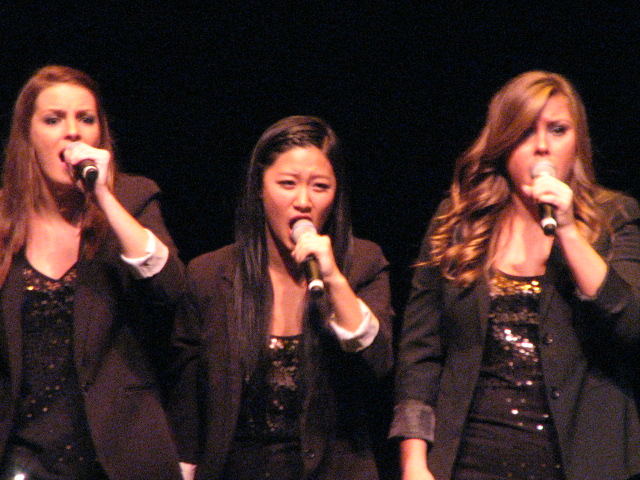
The first competitors to hit the stage were The Cocktails. The all-female crew came dressed in black with gold specks and white cuffs for a classy look. They opened on Linkin Park’s “Numb.” The song kicked off with some really rich chords. As it progressed, The Cocktails made a lot of really smart decisions in regards to dynamics and their effects, for example, with the group sound falling way out at the end of the first chorus, as the soloist sang, “and be less like you”—capturing the self-doubt and sorrow inherent in a teen-angsty rebellion song like this. Another effect I particularly liked showed up in the following verse where a select few women from the group sang a soft, almost ethereal echo of the soloist for a really neat, haunted effect. The group got really big in the homestretch, which made for a powerful moment, although the blend kind of came off the wheels as they got louder and higher. It’s so easy to lose track of that sort of thing when you reach the emotional climax of the song, but it’s one of those details that can separate the very good from the sublime. I felt like this ran a little long, and probably would have cut one of the repetitions of the chorus toward the end. Nonetheless, this was a strong, off beat opening number that helped assert The Cocktails as anything but a “girly” all-female group.
Next up, we heard Lady Gaga’s “You and I.” I love the shift to something more poppy and more clearly feminine to show off the group’s range. Strong, confident solo, with a bit of southern-country twang to it that I liked a lot for the added texture and personality it lent to the piece. The choreography was well-used here—there was plenty to keep the audience engaged from a visual perspective with very little of it transcending into the category of “movement for movement’s sake.” Nice job on the percussion. The best moment of this came toward the end when the group slowed way down and went choral with just two of the women singing “You and I,” then four, then multiplying from there. It was dramatic, and just varied enough to make it feel unpredictable. My only real qualm with this performance was that, again, the song felt really long. I’m sure a bit of this is due to the last two months of The Sing-Off adjusting my sense of a cappella time to revolve around two-minute performances. Regardless, I think The Cocktails really could have benefited from some creative cutting and/or throwing in a sample or two to spice the number up. As it stands, “You and I” ended up being the final song of their set, and I couldn’t help wondering if the group would have been better served with more clipped versions of both songs and fitting in a short third number. In any event, the performances on the whole were really strong, and did a wonderful job of breaking down all-female taboos about being too meek or too prim and proper. This was a powerful group that did a really strong job of setting the tone for the competition.
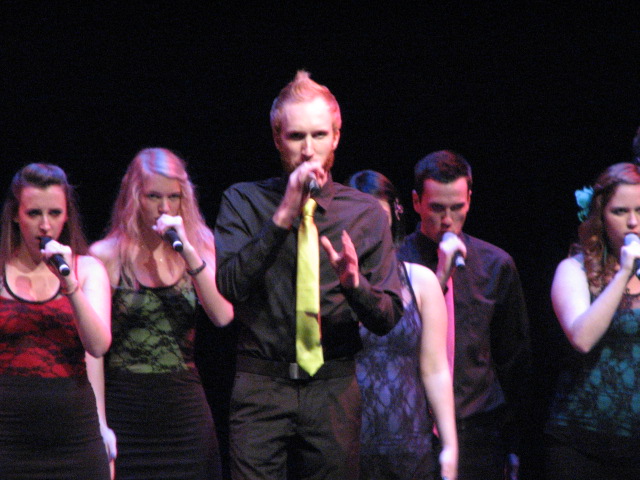
The next group out was Acappology. The co-ed squad had its guys in black tops and multi-colored ties; the women in multi-colored but mostly-consistently patterned tops and black skirts for an interesting look, that I think hit a really nice balance between uniformity and each member having his or her own unique flavor. The group opened with DeadMau5’s “Ghosts N Stuff.” I really dug the off-beat song selection, which such a cool, faux-electronic sound and swelling bass that really caught the crowd’s attention from the get-go, and spoke to group’s identity as artists—more on that to follow. Good, fitting solo, and some really fun bits of choreography like a slow motion, doing-the-robot slide between rows that we’ve seen before, but perhaps never in a more fitting context. Part of what I think really clicked about the group’s sound here is that it was evident they weren’t trying to sound “pretty”—they were attacking the legit style of the song. Neat little falsetto kazoo sound effects toward the close. I probably would have clipped this a little bit—gimmick sounds like this are usually best served when handled on a hit-and-run basis so you can wow the crowd then move on to the next thing. Unless you’re Naturally 7, you typically don’t want to linger too long on them (Naturally 7 gets away with this in spades, but I’m getting ahead of myself). Fun, fitting end when the group collapsed like robots shutting down on the finish.
Next up was Katy Perry’s “ET.” I think this represents one of the coolest things a group can do—find songs that are, in a sense really different, transitioning from an out-there techno-DJ riff to a pop princess, but at the same time, songs that have a link in their overarching tone and sound. These are both aggressively electronic songs, which makes them anything but natural choices for an a cappella group—which is what makes them awesome choices for this a cappella group to capitalize on a creative opportunity. Nice perc and bassline to lead this one off, and the group does a nice job again at simulating machine sounds. The sound is take-no-prisoners bold. I’m a little torn on the soloist, whose voice fits the song well, but her vocals seem to get a little lost in the power of the sound behind her for a bit of a sloppy result. Cool slow-down effects toward the end and excellent transition to the last song.
Acappology closed with Grace Potter and the Nocturnals’ “Paris (Ooh La La).” The soloist brings some serious pipes—no danger of her getting lost in the shuffle, and though I ordinarily grow wary of soloists who are so loud for so much of a song, I was fine with it as a contrast to the more understated efforts in the previous two songs, and in an effort to bring the set to a crowd-rousing finish. Fun “get it” syllables from the guys. I like the sexy little hip sway from the girls, though I thought it got a little redundant just for how often they repeated it. Excellent visual set up as the group formed a V-formation behind the soloist, alternating man-woman-man-woman, and the women leaned out as if to swoon on their parts Cool finisher overall that, on the surface may not have seemed to fit the other two songs as well, but the group had so well established its cool, electronic identity by this point that the audience was willing to follow them along to this song, and accept a somewhat electronified version of it as well. When a group can so thoroughly establish its own unique personality without ever boring the crowd or sounding too repetitive, it’s a real testament to the group’s arranging and song selection process. Fine showing for Acappology.
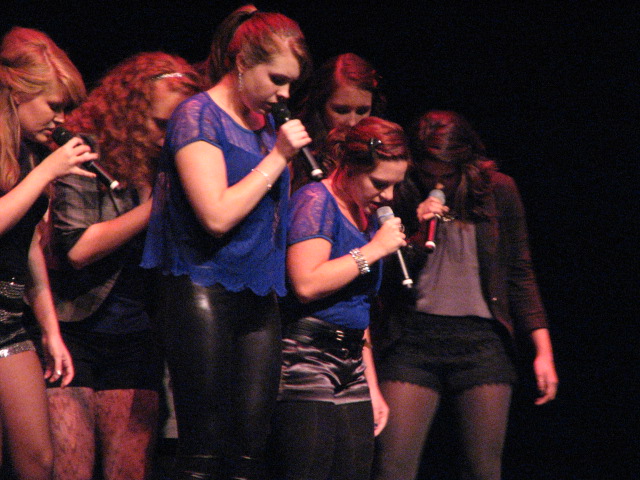
The Sapphires were our third competitors. This was a large all-female group and they came out clad in shades of black, gray, and blue. The ladies opened with Janelle Monae’s “Many Moons.” Really bold solo. I have to say that I think this was the group that most noticeably faced challenges on account of the unconventional mic set up on stage—the fact that every single group member had her own microphone. I can respect them for coming in with a game plan of all 18 girls singing their faces off and putting the audience on blast, but on account of the sheer volume of mics and how loudly they all sang, the sound got a bit messy and the audience got hit with a bit more noise than I would have liked to have heard. The upside of the mic issue was that it did allow us to hear just how much was going on with the arrangements, and what they were singing was clearly complex and intricate. When the perc came into the song, it seemed to help settle the group some, and they arrived at a really neat moment at which the group chorally echoed the soloist, en route to a point when the solo positively exploded. Very nice. The visual presentation was smart—utilizing the women’s sexuality more economically than what we saw from Acappology, saving it to build real moments. All in all, a solid opener.
The group transitioned immediately to “The Lonely” by Christina Perri. Soulful solo. I’m not entirely sure if it was intentional or not, but the soloist started far back enough on stage so that she was a bit obscured in the shadows, then stepped forward into the light as the first verse moved along, which I thought made for a really cool visual effect. Smart use of physical rearrangement rather than choreography per se to keep the visuals, in general, interesting. The group again came into some sound issues here that we can probably chalk up to the mics—again, the 18 voices were just kind of overwhelming, and when they purposefully went for a crescendo toward the end of the song, there just wasn’t much place for them to escalate to.
The Sapphires wrapped up with “The Bird and the Worm” by The Used. They opened with their backs to the crowd from the end of the preceding song, leading into a nice dramatic turn. Really good use of transitions between songs. The soloist sounded great, but, like the previous one, sort of stood aside from, rather than in front of the group, which was an interesting choice—on one hand, I liked seeing something different from the more traditional placement of the soloist squarely up front, but I sort of wanted to see more movement, and more of an effort to work the stage from the leads. On the topic of movement, the group sold its choreography really well here. At the risk of sounding like a broken record, the dynamics were an issue on this one as well (and, again, I’m sympathetic given they couldn’t have planned for 18 mics. The confidence and power were there, and to the group’s credit, they never sounded screechy. Nonetheless, quieter moments could have helped the biggest parts seem so much bigger, and I don’t think the group achieved the levels of aural drama or precision they were capable of on this closer. On a very picky note, I also wanted to note the way in which the group exited the stage. They nailed their finish and, despite my own reservations, you could tell the crowd was really behind them. But after they were done they turned to face the crowd, a few of them laughed a few of them waved, and they sort of scurried off the stage. Especially for a group like this that is so clearly so good at planning its visuals, a well-rehearsed bow does a lot to “put a ribbon” on a performance and tie it up professionally and neatly. The really good news for The Sapphires is that they’re already generating far more sound and demonstrating far more confidence than the stereotypical meek women’s group. When they round out their edges, and be more sure of the microphone situation, they have all the potential in the world to be amazing.
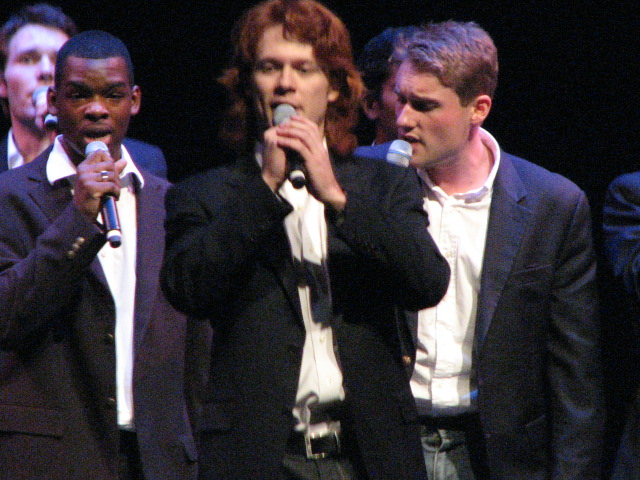
Next out, we heard from The Pitchforks. The all-male group wore charcoal blazers, white button-ups and jeans for a nice, traditional look. The first thing you notice about this group, particularly in contrast to the groups before it is the bass which just pounded at the start of Kanye West’s “All of the Lights.” Sick percussion, and cool echo sound effects. Silky, smooth solo, though he risks getting a bit lost in the sheer volume of the group. Nice little breakdown from a trio as the song goes on—this is the kind effect you can play with in such a large group, that smaller groups will really struggle with, because they’ll lose part of their background sound. Good dynamic variation, and the guys pack a pretty impressive amount of stuff and complexity within a finite time period—though this was probably as long as any song we heard over the course of the night, it never felt like it was dragging or repetitive, but rather like a journey. Well done.
Next, we heard “Black Balloon” by The Goo Goo Dolls. I didn’t love the song selection here—dated, commercial, a bit too even keel emotionally. None of these factors are, on their own, necessarily reasons not to cover a song, but when you combine them and don’t do anything particularly innovative with the arrangement, it doesn’t seem like a great choice to bring to a competition. I also felt the soloist’s voice, while quite good, was a little too classical sounding to really fit the song, particularly when his sound got bigger—it’s more of a personal preference, but when the audience notices that sort of thing, it takes them out of the moment of the song a bit. The group did work itself into a nice groove when the tempo picked up, and the perc was very good. All in all, this performance was perfectly fine, but a bit static for the context of this show.
The Pitchforks closed with Coldplay’s “Fix You.” Nice soft start, and I particularly like the effort the soloist made to get into character, sort of slumping and seeming to shrink himself down on stage to fit the opening of the song. While I mostly liked the solo from there—he had a great voice—he seemed a little ahead of the beat for much of the first verse. The group’s blend was really clean throughout this. I liked the decision for the group members to reconfigure their physical arrangement on stage as the song progressed, but was a little disappointed with the timing and lack of purpose to some of what they did. In particular, I really liked them spreading out into a line for a great big wall of sound toward the end of the bridge. However, they got into that line a full three or four measures before they got big on their sound—in doing so, telegraphing what was coming and not allowing the arrival of the visuals to complement the sound, the cumulative of effect of which robs the audience a lot of the drama and emotion of what should mark the climax of the song. The choral part to follow was really good, though I didn’t care for the very finish. The group was right to have most of the group fall out and let the soloist somberly sing the final leg of the piece, but I didn’t care for the little high, echoing riff that backed the solo. It was musically pretty, but seemed much more consciously artsy than organic to the song, which again stripped away some of the emotion sparseness I would have hoped for. All in all, it was a good closer to a good set, but I think a little more attention to what the group is putting out emotionally could make all the difference in helping a strong collection of talent advance to the next level of live performance.
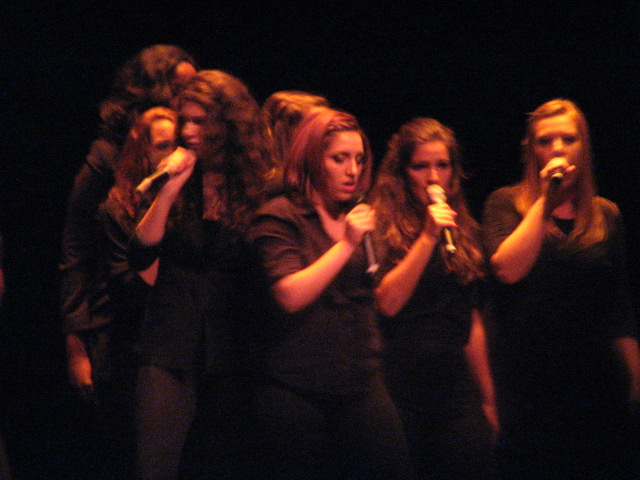
As excellent as the show had been up to this point, there was a certain feeling of anticipation in the air upon the arrival of the reigning ICCA South champs, The AcaBelles. The ladies in black blazers, black tops and black tights and sneakers for a simultaneously fun, distinctive, and professional look. They opened on an en medias res sample of Taylor Swift’s “Love Story before the tempo ground to a snail’s pace, the song stopped, and the soloist to follow declared, “Eff this story.” Cool transition into Rihanna’s “S&M”, featuring a soloist who works the stage powerfully and comprehensively. For every passing moment, the group came off cool and under control even while their sound swelled and they arrived at moments of positively belting the music. Excellent opener that went a long way toward establishing the group’s identity as women who are not to be trifled with.
In what’s becoming an AcaBelles staple, there was very little break between the first and second songs as the girls split into two groups, allowing the new soloist to make a slow and sultry entrance down the middle for Michael Jackson's "Dirty Diana". Great, bold sound all around. The ‘Belles worked in a really fun sample of Eric Benet’s “Femininity”, complete with lyric reversals to transform it into a song of woman’s empowerment—a trick that won’t work with a lot of songs, or a lot of women’s groups, but they were plenty up to the task. The women served up robust choreography that never felt forced. The group arrived at a true power moment as the whole group paused and the soloist let loose toward the end.
In a decision that—from conversations after the show—most folks either loved or hated, The AcaBelles closed with Beyonce’s “Run the World (Girls).” The song led off with a military march and count off. What followed was fittingly intense and brief enough to attack the song without the volume or verve ever waning or growing tiresome for the audience. The bulk of the song featured the soloist popping on the mic up front with two back up dancers right behind her, truly tearing it up. We’ve seen a handful of all-male groups use this sort of break out dance technique in the past—most prominently The Melodores in their run to the ICCA Finals last year. While I thought the approach would have been more effective had they reserved the backup dancers for only half the time, as a culminating moment, I still wasn’t nearly as bothered by it as some of my compatriots and loved the brash confidence—the swagger--inherent in such a performance. While I’d suggest retooling this a little to make the presentation more palatable to the more reserved sector of the audience I would maintain that The AcaBelles have very much remained on the right track to continue their all-female a cappella crusade.
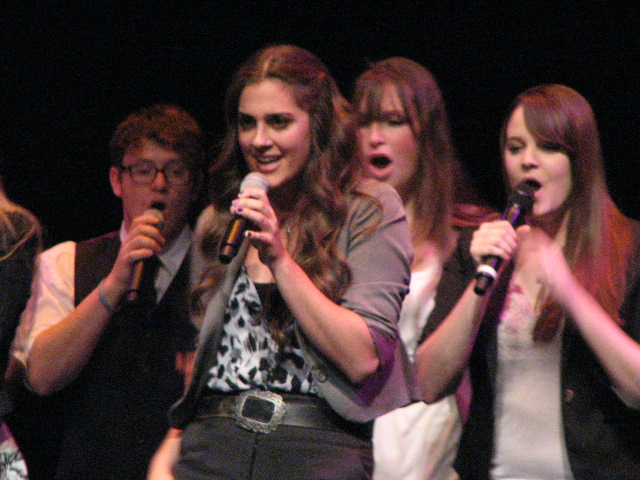
The final competitors were Pitch Slapped. The reigning ICCA international championships took the stage in their traditional black-white-gray professional attire. The group opened on Cee Lo Green’s “Bright Lights Bigger City.” Nice level of emotion infused on the solo. Great perc and bass work to lay the foundation for a really complex sound from the group. One of the things you have to appreciate about Pitch Slapped is the group’s ability to take a really recent pop ditty and not just throw an arrangement together to get it out there, but arrange it and perform it as a serious musical piece. My only qualm at all about this performance was that—as a result of performing right after The AcaBelles—it seemed a little sparing in intensity. It’s a minor quibble, and this isn’t really the sort of song that calls for a ton of emotional grit. It’s something worth thinking about, though, as a group tries to select which of the outstanding numbers from their repertoire they’re going to deem the best fits for competition.
Next up was The Beatles’ “We Can Work It Out.” The song started really slow and melancholy before popping into a fun jazzy song. This is one of those really cool instances when a group can take a classic song, really reinvent it, and have it top-to-bottom work. It doesn’t hurt to have a phenomenal soloist (Sing-Off viewers will recognize her as Delilah’s Ingrid) who can navigate the tricky waters from even keel-to-loud-to-positively ripping into the music, and still have us eating out of the palm of her hand the whole way. Excellent power moment backed by three female vocals. With the possible exception of The SoCal VoCals, I don’t know that I’ve ever heard a collegiate group make better use of its female contingent than Pitch Slapped does from song to song. Excellent middle number.
The group wrapped up with Beyonce’s “Love on Top.” Great cool and sexy female solo to start this one, and things grew all the more interesting when the solo transitioned to one of the guys. The interplay between the two easily could have come across as forced, but the two of them struck just the right balance between interacting and being subtle in their staged affections, that it never got on my nerves, and instead added a layer of narrative to the story of this song (besides which they both sounded phenomenal). Consider everything I said about the group’s treatment of the Cee Lo song, then multiply it by ten on this one. Huge dynamic shifts? Check. Key changes out the wazoo? Check. Never losing their impeccable sense of tuning and showmanship? Checkmate. This is the third time I’ve had the pleasure of hearing this group live, and I don’t know if I’ve ever heard them better than they were on this song.
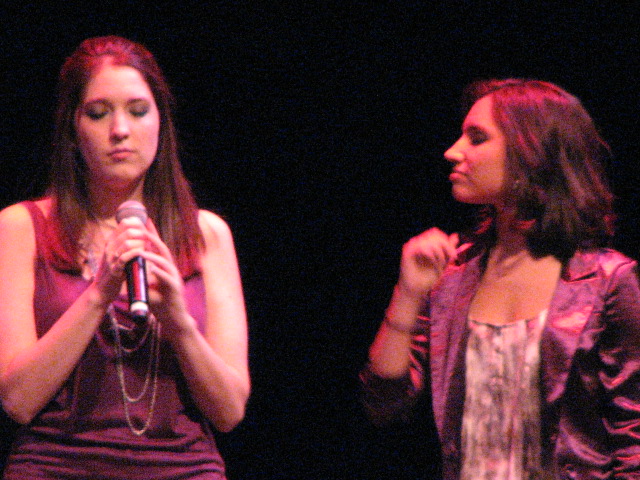
While the judges deliberated, it was time for professional groups Overboard and Musae to entertain the crowd. They more than fit the bill, with Overboard’s set including really fun renditions of “If You’re Wondering If I Want You To (I Want You To),” “Moves Like Jagger,” and “How Low” in addition to a truly transcendent unplugged treatment of “Free Bird,” and a crowd rousing take on “Life is a Highway.” Musae, which formed coming out of SoJam 2010, showed remarkable chops for their brief time together . Their set included “Without You,” “I’m Not Falling in Love,” “Gone and Never Coming Back,” an inspired Donna Summers medley, “I Am Woman,” and a sterling, fresh-sounding take on “Natural Woman.” Musae’s showing reinforced much of the competition’s, and the broader weekend’s theme that all-female a cappella is changing in bold new ways, and before long no one will be able to consider women second-class citizens in the a cappella universe again.
To wrap up our coverage of the competition, and get to my notes on the rest of the weekend, here were my picks, followed by the official results.
ACB Picks
Overall Placement
1. Pitch Slapped
2. The AcaBelles
3. Acappology
Best Soloist:
1. Pitch Slapped for “We Can Work It Out”
2. Pitch Slapped for “Love On Top” (tie for both soloists)
3. The AcaBelles for “S&M”
Best Choreography:
1. The AcaBelles for “Run the World (Girls)”
2. The Sapphires for “The Bird and the Worm”
3. Acappology for “Ghosts N Stuff”
Best Arrangement: Pitch Slapped for “Love on Top”
SoJam Official Results
Overall Placement
1. Pitch Slapped
2. The AcaBelles
Audience Favorite Award (determined by text message voting: The Sapphires
Best Female Soloist: Pitch Slapped for “We Can Work It Out”
Best Male Soloist: Pitch Slapped for “Love on Top”
Best Staging: Acappology
Best Choreography: The AcaBelles
Best VP: The Pitchforks
Best Arrangement: Pitch Slapped for “Love On Top”
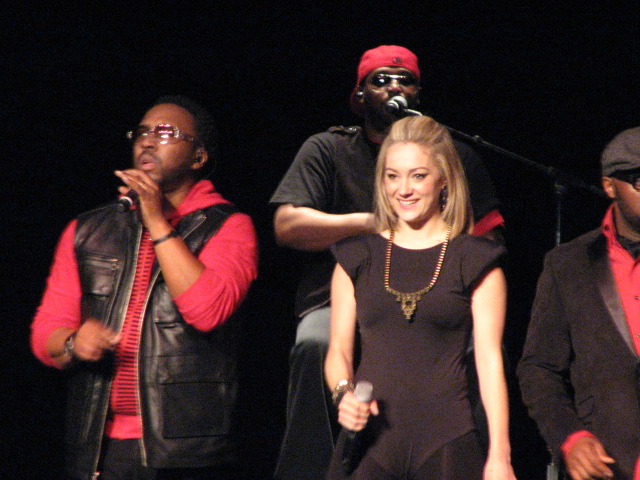
Saturday morning and afternoon were highlighted by workshops around the Duke campus. Of course, we were only able to attend a handful of the selections ourselves but particular standouts included Lo Barreiro’s panel discussion with Musae and The Boxettes on the state of all-female a cappella, Chris Crawford’s talk on the legal details of recording and distributing a cappella music, and Benjamin Stevens’ session on listening for the meaning of music (the scope of which is dramatically undercut in this part-of-a-sentence description). Saturday night wrapped up with a professional showcase featuring England’s insane all-female quintet The Boxettes and been-around-the-world pros Naturally 7. A goodly portion of the audience seemed to be new to The Boxettes’s sound, and, in a word—wow. The women sang a series of originals highlighted by the sheer intensity and power of their rhythm section, fueled by a woman who goes by Bellatrix, who is the reigning female world beatbox champion and whose bass sound is the strongest I’ve ever heard from any man, woman or child. Bellatrix aside, it’s a group of stars, top to bottom, with no weak points in between. Naturally 7 managed to perform a truly remarkable and impressively diverse set, informed by the sounds of pop, rock, R&B, Motown and more. If you ever want to truly blow your mind, just check out the electric guitar sound these guys can pull off—if you’re ever trying to convince a non-believer of the potential for a cappella to replicate instrumental sounds, this is more than a good starting point: it’s the end of the discussion.
To all the folks at CASA who worked to make this past weekend happen (including Dave Sperandio, Kristin LoBiondo, Mark Hines, Benjamin Stevens, David Longo, Steve Ryan, Virginia DeMoss, Thomas King, Shane Ardell, Jenn Fiduccia, and Nicole Milano), weekend hosts Duke Rhythm & Blue, and all of the wonderful folks who attended, we would like to say thank you, and we can only hope we’ll see you all again next year!